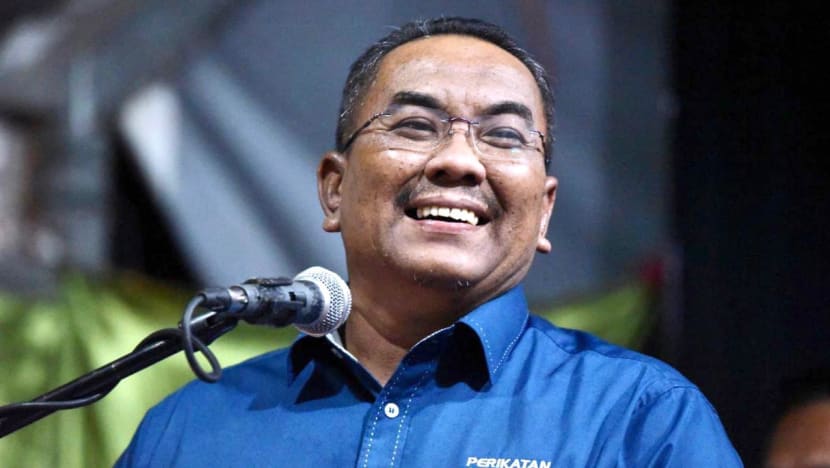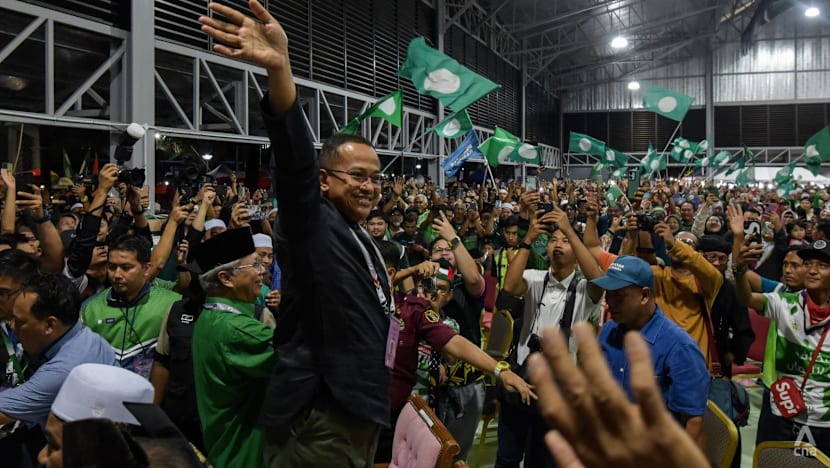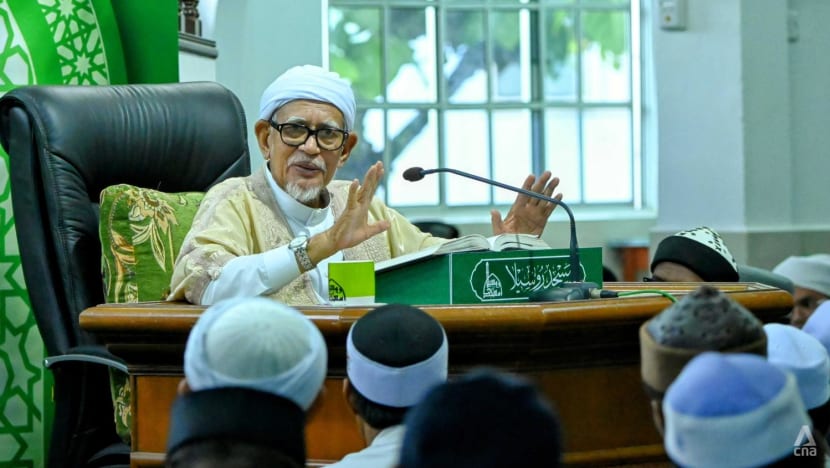analysis Asia
PAS leader pulls out of race for key post in Malaysia Islamist party - what are the political implications?
The leadership succession in Parti Islam Se-Malaysia (PAS) remains unclear following Kedah Chief Minister Muhammad Sanusi Md Nor’s withdrawal from this month’s internal party polls.


This audio is generated by an AI tool.
KUALA LUMPUR: A key Parti Islam Se-Malaysia (PAS) leader's decision not to contest a top position in upcoming internal polls has highlighted the challenges of going up against the party’s influential ulama (religious scholar) faction, analysts say.
The pull-out of Kedah Chief Minister Muhammad Sanusi Md Nor, 51, who is seen to be from PAS’ other “professional” faction, also raises questions of leadership succession and whether the party can gain broader acceptance from Malaysians ahead of the next general election due by 2028, the experts add.
Sanusi reportedly confirmed on Saturday (Aug 30) that he will not run for one of three vice-president posts at the party's upcoming election, despite being one of four candidates nominated for the post. He said he will only be defending his seat in the Central Working Committee for the 2025 to 2027 term, news outlet Utusan Malaysia reported.
The internal election will be held during PAS’ annual general meeting, or muktamar, in Kedah from Sep 11 to 16.
This means PAS is likely to see an unchanged leadership line-up after its latest polls, with its top two posts - president and deputy president - uncontested and the three other vice-president candidates re-elected as incumbents.
The party has a long-held tradition of absolute loyalty to leaders and shunning infighting for top posts.
PAS' top leadership positions are dominated by members of its ulama faction, and Sanusi's decision could be seen as a shrewd one to ensure he retains influence in the party as its election director, instead of losing to Terengganu Chief Minister Ahmad Samsuri Mokhtar, the analysts said.
Fifty-four-year-old Ahmad Samsuri - a popular technocrat and an incumbent PAS vice-president - is the only member in the party's top five positions not seen as part of the ulama faction.
Analysts whom CNA spoke to agreed that PAS will continue to rely on its partner Parti Pribumi Bersatu Malaysia (Bersatu) in the opposition Perikatan Nasional (PN) coalition to further its ambitions of governing Malaysia.
This is because some Malaysians still do not have confidence in PAS at the national level, while Bersatu leaders have had relatively more experience in the federal government, political analyst Awang Azman Awang Pawi of Universiti Malaya said.
For instance, Bersatu president Muhyiddin Yassin is a former prime minister while the party’s deputy president Hamzah Zainudin has held various ministerial positions in past administrations, including that of home minister.
Awang Azman said that PAS' lack of leadership renewal could create a perception that the party is closely guarded by several "elites" and is not open to differences in opinion.
"The absence of leadership contests at the highest level could be seen as a lack of room for criticism or new leadership to emerge," he said, adding that it weakens the party's ability to attract youths or promote talent.
"The ability to win without contest makes it easier for old leaders to remain in power, stunting natural leadership succession."
“STRATEGIC” SANUSI
Still, Sanusi's decision to withdraw from the internal polls could be attributed to how he wants to continue playing an important role as PAS election director ahead of the Sabah state election in the coming months and the 16th General Election (GE16), Awang Azman said.
An election director steers the party's electoral campaigns, setting strategies and seat targets as well as coordinating election machinery and public messaging.
This is the third time that Sanusi has refused the vice-president post - he did the same in the 2023 and 2021 internal elections - despite being eligible after nominations from several PAS divisions.
In July, he said he was not ready to take up the vice-president post, and that he had no issues remaining in the party’s second-tier leadership if there were more suitable and capable candidates for the role, Malaysia’s Berita Harian reported.
“This year, I’ll consider whether it’s necessary (to stand for the post). If there’s someone better and more qualified, I’ll campaign for him,” he was quoted as saying.
“PAS isn’t like other parties. We don’t scramble for posts to the point of quitting ministerial positions.”
The Kedah chief minister was taking a swipe at Prime Minister Anwar Ibrahim’s Parti Keadilan Rakyat (PKR), which held its own internal polls in May that saw two leaders quit as federal ministers after losing their party positions.
Analysts said Sanusi’s decision could also be a “strategic” one in part due to a recognition that he would have faced a tough battle.
The ulama faction’s dominance of PAS means incumbent vice-presidents Idris Ahmad, 61, and Amar Abdullah, 66, would likely be re-elected, said Mohd Yusri Ibrahim, chief researcher at Malaysian think-tank Ilham Centre.
This leaves Sanusi in a likely straight fight against Ahmad Samsuri - a contest that the analyst believes is “difficult” for Sanusi to win.
"At the same time, Sanusi probably wants Ahmad Samsuri to remain as vice-president. For me, Sanusi made a clever and strategic decision. It is good for him and good for the professional faction,” Yusri said.
Without a direct clash, both members of the professional faction would retain their positions as vice-president and election director, ensuring their continued presence in PAS’ leadership team, he explained.

Last Saturday, PAS secretary-general Takiyuddin Hassan said Sanusi did not face any pressure to decline his nomination for a vice-president post, reported Malaysia's Berita Harian.
Takiyuddin said there was nothing unusual about Sanusi’s decision to drop out, adding that party members were often reminded that positions were responsibilities, not matters of prestige or something to be fought over.
Yusri said that while some may see PAS as an “open” party in Malaysia's political landscape - in that it contests elections and sets national agendas like other parties in the country - its internal processes, including leadership elections, remain opaque.
“Some could say PAS and Malaysia face limitations in getting the best people as leaders when the top posts are uncontested, but the party knows better about what it wants,” he added.
"In these matters, PAS is somewhat exclusive. It has its own culture.”
POLITICAL RELEVANCE
Overall, Sanusi’s rejection and PAS' decision to retain its top leaders without competition show the party's conservative approach and culture of walak (loyalty), said Awang Azman.
“While it reflects efforts to maintain stability, it also risks weakening the principles of internal democracy,” he said.
"In the long run, a balance between stability and internal competition is important to ensure the party remains relevant and adaptive."

While the ulama leadership in PAS has been a dominant force in Malaysian politics, party president Abdul Hadi Awang, 77, has acknowledged room for improvement.
At the 2023 muktamar, Abdul Hadi admitted that one of the party’s weaknesses is its difficulty in garnering non-Muslim support. In the 2024 meeting, PAS delegates voted to allow non-Muslims to become associate members of the party.
Awang Azman feels the ulama faction’s dominance in framing PAS’ political ideology will continue to make it difficult for more Malaysians to accept the party.
Already, PAS lacks support among non-Muslims, moderate Muslims and those in urban areas, he pointed out.
"They are perceived as not contributing good national ideas, only playing up racial and ethnic issues,” Awang Azman said.
"PAS is relying on Bersatu leaders, who have experience in the federal government from their time in UMNO (United Malays National Organisation) and PKR."
PAS STILL NEEDS BERSATU
News outlet Malaysiakini previously reported that PAS had proposed a leadership restructure of PN, giving Bersatu deputy president Hamzah greater operational powers. The PAS secretary-general Takiyuddin denied there were such plans.
In another Malaysiakini report, the PN chairman and Bersatu president Muhyiddin revealed he had previously suggested that PAS take over the PN leadership as part of a rotational system, but that PAS declined this.
“According to insider information, PAS is no longer obsessed with Muhyiddin as a prime minister candidate; it is expected to name another figure from Bersatu,” Yusri said.
At the 15th General Election (GE15) in November 2022, PAS defied expectations and emerged as the party with the highest number of seats in parliament. It also won in many places even outside its largely conservative and rural stronghold.
PAS continued its streak at the 2023 state elections by winning most of the 127 seats it contested in and forming the state government in Kelantan, Terengganu, Perlis and Kedah.
Ahead of GE16, Yusri posited that PAS is still putting its hopes in Bersatu to “lead Malaysia”.
“I say this because PAS has not been seen as eager to name its own prime minister candidate ahead of GE16,” he said.
“That’s the situation until now, although whether that will change at the muktamar, we don’t know.”




















